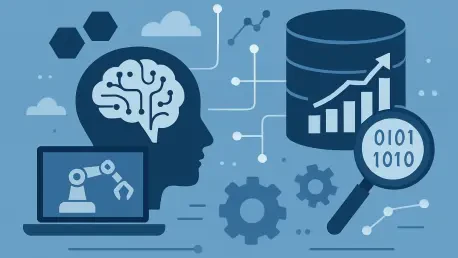In today’s fast-paced industrial landscape, the merging of Generative Artificial Intelligence (GenAI) and big data marks a pivotal shift with transformative potential. As industries battle the challenge of increasing operational efficiency while reducing costs, these technologies present powerful tools that redefine traditional processes. By employing advanced algorithms and data-driven strategies, businesses can propel productivity and innovation to new heights. This guide delves into best practices for leveraging GenAI and big data, offering insights into their profound impact on industrial operations and how companies can optimize their integration.
Introduction to GenAI and Big Data in Industry
GenAI and big data, once nascent concepts, have now evolved into central components of modern industrial processes. GenAI’s ability to generate content, designs, and scenario simulations has complemented the deep insights provided by big data, forming a powerful partnership. This integration facilitates automation, enhances design processes, and empowers decision-makers with actionable intelligence. Key transformative areas include design optimization and real-time quality control, which are reshaping how industries approach efficiency and security concerns.
The importance of these technologies cannot be overstated, especially as industries seek strategic advantages in a competitive global market. Adopting GenAI and big data enables businesses to harness patterns and trends that drive cost reduction, improve security measures, and boost overall efficiency. By unlocking the potential of vast datasets, industries can elevate operational standards and meet evolving market demands.
Importance and Strategic Benefits of GenAI and Big Data
Strategically implementing GenAI and big data is no longer optional but a necessity for industries aiming to maintain a competitive edge. These technologies offer substantial benefits, including enhanced operational efficiency and significant cost savings. By automating routine processes and optimizing resource allocation, businesses can streamline operations and focus on innovation.
Moreover, GenAI and big data bolster security protocols by analyzing vast amounts of information for anomalies and potential threats, thereby fortifying industrial systems against cybersecurity risks. The integration of these technologies enables businesses to create robust, data-driven strategies that prevent costly downtimes and ensure sustained success. Consequently, embracing GenAI and big data can transform industries into agile, forward-thinking entities prepared for future challenges.
Best Practices for Integrating GenAI and Big Data
Implementing GenAI and big data requires a strategic, step-by-step approach to achieve the desired transformation. Organizations should begin by assessing their current infrastructure and identifying specific areas where these technologies can provide the greatest impact. Conduct thorough evaluations to understand data landscapes and ensure that systems are equipped to handle the complexities of GenAI and big data applications.
Leveraging GenAI for Enhanced Design and Automation
GenAI revolutionizes design and automation by generating optimized models and facilitating seamless workflows. By employing algorithms that simulate various scenarios, companies can refine product designs and accelerate time to market. The aerospace industry exemplifies this by utilizing GenAI to enhance aircraft design, significantly improving safety and performance standards. Through automated design processes, businesses can reduce human error and increase precision, fostering innovation across sectors.
Utilizing Big Data for Improved Quality Control
Big data analytics play a pivotal role in elevating quality control mechanisms by providing real-time insights and predictive capabilities. AI-driven vision systems are employed in manufacturing to scrutinize production processes, ensuring that products meet stringent quality standards. By utilizing big data, companies can establish automatic pass/fail criteria and detect deviations, thereby minimizing defects and reducing waste. Such advancements are instrumental in maintaining competitive advantages and customer satisfaction in an ever-demanding market.
Conclusion and Strategic Adoption Advice
The successful adoption of GenAI and big data technologies has redefined industrial processes, paving the way for unprecedented levels of efficiency and innovation. As industries integrate these powerful tools, considerations around infrastructure, cybersecurity, and strategic planning remain paramount. Companies are encouraged to emphasize a phased approach, aligning technical readiness with clear business outcomes to capitalize on these technologies fully.
Industries poised for transformation include aerospace, automotive, and manufacturing, where the application of GenAI and big data promises to revolutionize operations. Reflecting on the trajectory of these technologies, it is clear they have moved beyond buzzwords to become integral assets driving industrial evolution. Through thoughtful and calculated implementation, organizations can unlock the full potential of GenAI and big data, solidifying their status as future-ready leaders within the industrial realm.









